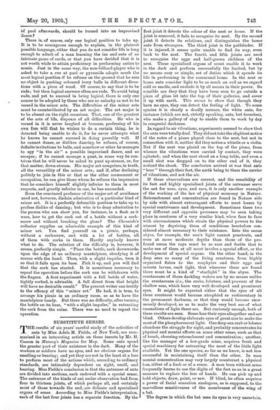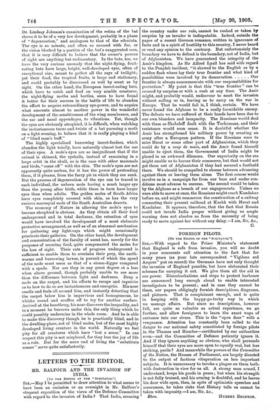SUBSTITUTE SENSES. first joint it detects the odour of the
nest or home. If the joint is removed, it fails to recognise its nest. By the second joint it detects its relations, and distinguishes the home ants front strangers. The third joint is the pathfinder. If it is injured, it seems quite unable to find its way, even back to the nest. The fourth and fifth joints are used to recognise the eggs and half-grown children of the nest. These specialised organs of scent enable it to work in the dark and perform successfully the limited, but by no means easy or simple, set of duties which it spends its life in performing in the communal home. In the nest or home ants consider light to be as much an evil as we regard cold or smells, and exclude it by all means in their power. So sensible are they that they have been seen to go outside a piece of glass let into the top of their galleries, and cover it up with earth. This seems to show that though they have no eyes, they can detect the feeling of light. To some species it is clearly a deadly menace, the white ants, for instance (which are not, strictly speaking, ants, but termites), who make a gallery of clay to enable them to work by day in congenial darkness.
In regard to air vibrations, experiments seemed to show that the ants were totally deaf. They did not take the slightest notice of the notes of a piano played close to the nest, but not in connection with it, neither did they notice a whistle or a violin. But if the nest was placed on the top of the piano, from whence the vibrations were carried by contact, they were agitated; and when the nest stood on a long table, and even a small shot was dropped on to the other end of it, they noticed the shock. The conclusion arrived at was that ants " hear " through their feet, the earth being to them the carrier of vibrations, and not the air.
If these observations are correct, and the sensibility of its feet and highly specialised joints of the antennae serve the ant for nose, eyes, and ears, it is only another example of the working of the law of physical economy in Nature. Retrenchment and concentration are found in Nature side by side with almost extravagant efforts to meet losses by special contrivance and development. Sometimes these two very different and opposite processes may be seen taking place in creatures of a very similar kind, when face to face with circumstances which strain the physical powers to the utmost by depriving them of conditions heretofore con- sidered almost necessary to their existence. Into the ocean abyss, for example, the sun's light cannot penetrate, and even at more moderate depths than those of the pro- found ocean the rays must be so rare and feeble that to make use of them at all must involve a special effort, or the development of special organs. On the other hand, in the deep seas so many of the living creatures, from highly organised fishes to the zoophytes and their eggs and minute larvae, emit light, that wherever these are found there must be a kind of " starlight " in the abyss. The crustaceans of those darkling waters are by no means unlike the crustaceans (i.e., the crabs, lobsters, and prawns) of the shallow seas, which have very well developed and prominent eyes. It might be expected either that the eyes of all these creatures would become atrophied or rudimentary in the permanent darkness, or that they would become enor- mously developed, so as to make the very best use of what emanations of light there are. But curiously enough, both of these results are seen. Some lose their eyes altogether and are blind. Others develop elaborate eyes of great size to make the most of the phosphorescent light. One deep-sea crab or lobster abandons the struggle for sight, and probably concentrates its physical and mental efforts on some other sense, such as that of touch, choosing retrenchment and concentration; another, like the manager of a low-grade mine, acquires fresh and special machinery for extracting the most of the little light available. Yet the one species, so far as we know, is not less successful in maintaining itself than the other. In man mental concentration may very largely counteract a physical loss, either of a limb or of a sense. A man born without arms frequently learns to use the digits of the feet so as in a great measure to replace the loss of hands. He can pick up and hold objects, draw, paint, or sew. If blind, he often acquires a power of facial sensation analogous, as is sapposed, to the marvellous sensitiveness of the membranes of the wing of a bat. Dr. Lindsay Johnson's examination of the retina of the bat shows it to be of a very low development, probably in a phase of " degeneration," and analogous to that of the edentata. The eye is so minute, and often so covered with fur, or the vision blocked by a portion of the bat's exaggerated ears, that it is very difficult to believe that the owner's powers of sight are anything but rudimentary. In the bats, too, we have the very curious anomaly that the night-flying, fruit- eating bats have large, bright, well-developed eyes, often of exceptional size, meant to gather all the rays of twilight; yet their food, the tropical fruits, is large and stationary, and could probably be discovered as well by scent as by sight. On the other band, the European insect-eating bats, which have to catch and feed on very nimble creatures, the night-flying moths and beetles, seem to have found it better for their success in the battle of life to abandon the effort to acquire extraordinary eye-power, and to acquire what amounts almost to another power in the wonderful development of the sensitiveness of the wing membranes, and the ear and nasal appendages, to vibrations. Yet, though the eyes are obviously atrophied, it is difficult, when watching the instantaneous turns and twists of a bat pursuing a moth on a light evening, to believe that it is really playing a kind of " blind man's buff."
The highly specialised burrowing insect-feeders, which abandon the light totally, have naturally almost lost the use of their eyes. A mole's eyes are so insignificant that if the animal is skinned, the eyeballs, instead of remaining in a large orbit in the skull, as is the case with other mammals and birds, "come off" with the skin. The mole's eyes are not apparently quite useless, for it has the power of protruding them, if it pleases, from the furry pit in which they are sunk. But the process of degeneration of the eye can be traced in each individual, the unborn mole having a much larger eye than the young after birth, while these in turn have larger eyes than when adults. The golden moles of South Africa have eyes completely covered with skin, as has the very curious marsupial mole of the South Australian deserts.
The economy of Nature in allowing the mole's eyes to become atrophied is obvious. As they obtain all their food underground and in total darkness, the retention of eyes would have involved the development of a most elaborate protective arrangement, as well as of an abnormal mechanism for gathering any light-rays which might occasionally penetrate their galleries. On the other hand, the development and concentration of the faculty of scent has, merely for the purposes of securing food, quite compensated the moles for the loss of sight. Their rate of progress underground is sufficient to enable them to overtake their prey, the earth- worms and burrowing larvae, in pursuit of which the speed of the mole must seem as that of a steam-digger compared with a spade. Nor are they in any great degree at a loss when above ground, though probably unable to see more than the difference between light and darkness. Drop a mole on the carpet, and his efforts to escape and inquiries as to how to do so are instantaneous and energetic. His nose smells and feels all around him, and instantly detecting that the carpet below him is impervious and homogeneous, he whisks round and scuffles off to try for another surface. Arrived at the hearthrug, his nose discovers the inequality, and in a moment he burrows under this, the only thing which be could possibly undermine in the whole room. And he is able to make this discovery though he is practically blind, and in the dwelling-place, not of blind moles, but of the most highly developed living creature in the world. Naturally we feel pity for all creatures which have "lost a sense." In one respect this pity is not misplaced, for they lose the joy of life as a rule. But for the mere end of living the "substitute senses" serve quite satisfactorily.







































 Previous page
Previous page